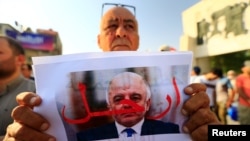Iraq's top Shi'ite cleric Grand Ayatollah Ali al-Sistani called for a government to be formed as soon as possible to tackle corruption and poor services as further protests took place in the south of the country on Friday.
In a sermon delivered by a representative, Sistani — who is revered by millions of Shiites in Iraq and elsewhere — told the incumbent caretaker administration of Prime Minister Haider al-Abadi to respond to protesters' complaints.
"The current government must work hard, urgently, to implement citizens' demands to reduce their suffering and misery," Sistani's representative said in the Shi'ite holy city of Kerbala.
Shortly after the speech, thousands of people protested in cities in the long-neglected south, Iraq's Shi'ite heartland, against the lack of proper government services and jobs. In Basra, the main southern oil hub city at the edge of the Gulf, about 2,000 people gathered outside the headquarters of
the provincial governorate.
"We need to launch a new war. But this time it should be against corrupted government and not terrorism," said unemployed Wathiq Abdul Ameer, 32.
Protests were also held in the southern cities of Amara and Nasiriya.
Demonstrations over the same issues have occurred in the past but the recent unrest has been more widespread.
Struggle to form government
Anger is mounting at a time when politicians are struggling to form a government after the May 12 election, which was marred by allegations of fraud, prompting a recount.
Abadi, who is seeking a second term in office, is heading a fragile caretaker government, in place until a new administration is formed.
A political bloc led by cleric Moqtada al-Sadr won a majority in the poll on an anti-corruption platform which had wide appeal among voters.
Sistani's representative said the next prime minister "must launch a relentless war against the corrupted and those who protect them."
Abadi said he supported Sistani's remarks and guidance, according to a statement from his office.
Sistani, who rarely intervenes in politics but has wide influence over public opinion, proposed a roadmap with guidelines which the next government should follow to ease economic hardship and fight corruption.
He said the new government should not include officials accused of corruption and the misuse of power, or officials who promote sectarian separation.
Baghdad-based political analyst Ahmed Younis said Sistani had sent a clear message that Abadi's government had failed to put an end to corruption or provide basic services.
"Sistani made it clear Abadi's government has failed to do the job and the new government must fix the unresolved issues. This is a really tough obstacle ... for Abadi."





